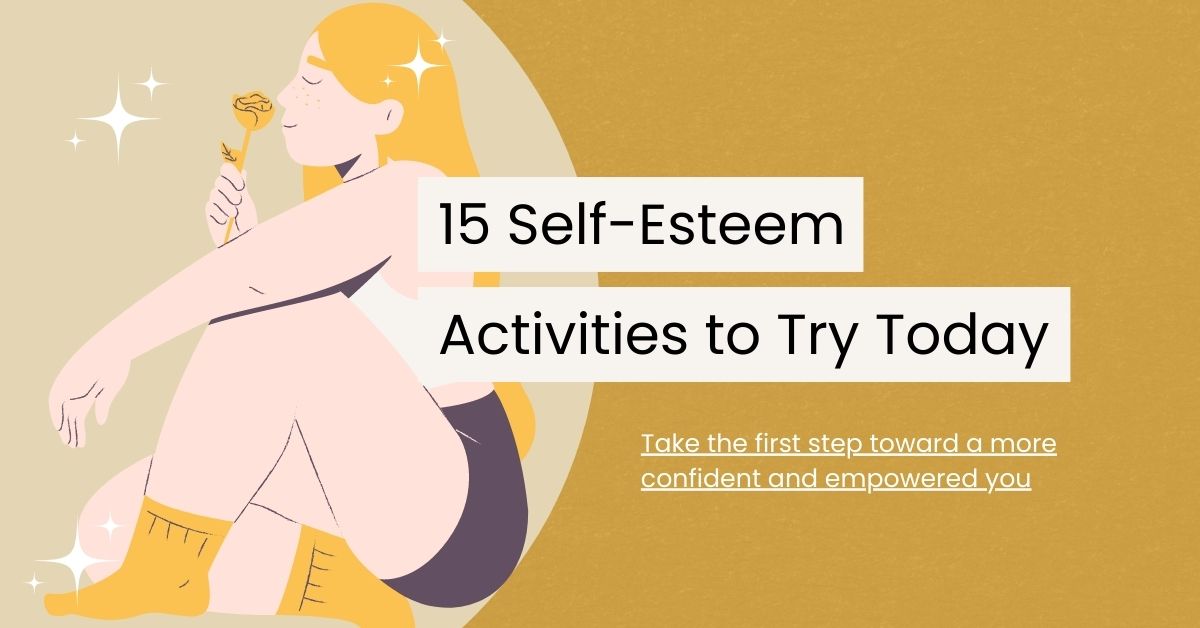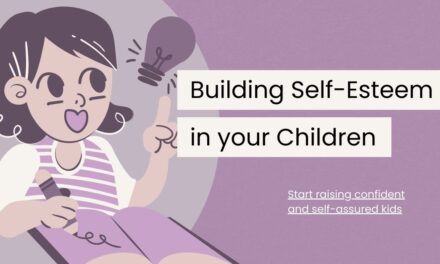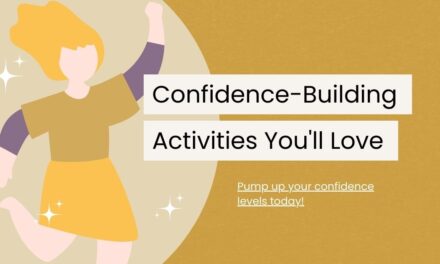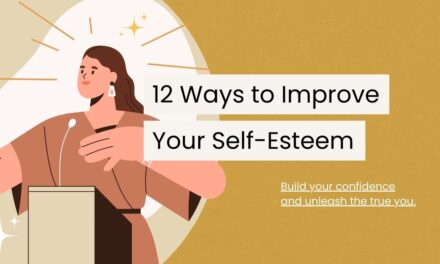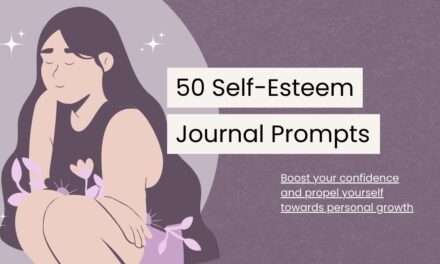Last Updated on August 15, 2023
Do you ever find yourself doubting your abilities or struggling with self-confidence? We’ve all been there. Building self-esteem is a journey, and sometimes, we need a little guidance to boost our belief in ourselves.
The good news is that there are simple yet powerful self-esteem activities you can try right now to transform your life. Are you ready to take the first step toward a more confident and empowered you? Let’s dive in!
List of Self-Esteem Activities You Can Try
Here are some transformative self-esteem activities to help you build a stronger sense of self and boost your confidence. From practicing positive affirmations and journaling for self-reflection to stepping out of your comfort zones and embracing a growth mindset, each activity is designed to empower you on your journey to improved self-esteem. Let’s explore these 15 self-esteem activities that will elevate your self-belief and lead you towards a more confident and empowered version of yourself!
1. Positive Affirmations
Positive affirmations are empowering statements that reinforce a positive self-image and mindset. By repeating these affirmations regularly, you can reprogram your subconscious mind to believe in your capabilities and worthiness.
Start each day with a few affirmations that resonate with you and say them with genuine conviction. Here are some examples of what you can say to yourself:
- “I am capable and deserving of success in all areas of my life.”
- “I believe in myself and my abilities to overcome any challenges.”
- “I am worthy of love and respect, and I attract positive relationships.”
Over time, you’ll notice how these positive thoughts replace negative self-talk, leaving you feeling more self-assured and capable.
Want to get more affirmations about confidence? Check out this article!
2. Journaling for Self-Reflection
Journaling is a powerful tool for self-awareness and self-discovery. Set aside time each day to write in a journal, allowing yourself to explore your thoughts, emotions, and experiences. Here are some examples of journal prompts you can start with:
- Write about a recent achievement and how it made you feel proud and accomplished.
- Describe a difficult situation you encountered and reflect on the lessons learned from it.
- Explore your goals and aspirations, identifying steps you can take to achieve them.
By putting your thoughts onto paper, you gain clarity on your feelings and challenges, making it easier to address and overcome them. Additionally, journaling allows you to celebrate your achievements, track your progress, and witness your personal growth, boosting your self-esteem along the way.
If you are interested in learning more about journaling for beginners, I have a comprehensive prompts list here.
3. Gratitude Practice
Gratitude is a key ingredient in building a positive self-perception. Make it a habit to practice gratitude daily by listing three things you’re grateful for in your gratitude journal. It can be statements like:
- “I am grateful for the support of my family and friends during tough times.”
- “I appreciate the opportunity to pursue my passion for photography and express myself creatively.”
- “I’m thankful for the small acts of kindness I receive daily that make my life brighter.”
Cultivating an attitude of gratitude shifts your focus from what you lack to what you have, fostering contentment and self-appreciation. The more you acknowledge and appreciate the positive aspects of your life, the more you’ll realize the abundance of strengths and blessings within you.
4. Visualization and Goal Setting
Visualization is a powerful technique used by athletes, performers, and successful individuals worldwide. Take a few moments each day to visualize yourself accomplishing a specific goal or succeeding in a challenging situation. For example:
- Visualize yourself confidently delivering a presentation and receiving praise for your work.
- Set a goal to improve your public speaking skills and imagine yourself giving a successful speech.
- Envision yourself achieving a healthy work-life balance and experiencing a sense of fulfillment.
This mental rehearsal helps build confidence and prepares your mind for success.
Pair visualization with concrete goal-setting. Break down your aspirations into achievable steps and create an action plan. As you witness yourself making progress towards your goals, your self-esteem will naturally soar.
5. Confronting and Challenging Negative Thoughts
Negative self-talk can be incredibly damaging to self-esteem. Become mindful of your inner dialogue and question the validity of negative thoughts. Are they based on evidence or merely assumptions? Challenge these limiting beliefs by replacing them with positive and realistic affirmations. Here are some examples:
- Replace “I’ll never be good enough” with “I am constantly improving and growing in every aspect of my life.”
- Transform “I’m a failure” to “I faced a setback, but I can learn from it and come back stronger.”
- Shift from “I always mess things up” to “Everyone makes mistakes, and I can learn from mine.”
Instead of berating yourself for mistakes, focus on the lessons learned and the growth achieved. Through this process, you’ll cultivate a kinder and more supportive relationship with yourself.
6. Mindfulness Meditation
Mindfulness is the practice of being fully present in the moment without judgment. Engage in mindfulness meditation by sitting quietly and focusing on your breath or bodily sensations. This practice helps you become more aware of your thoughts and feelings, allowing you to respond to challenges in a calm and centered manner.
As you cultivate mindfulness, you’ll develop a deeper connection with yourself and an increased sense of inner peace and acceptance.
7. Stepping Out of Comfort Zones
Stepping out of your comfort zones is essential for personal growth and building self-esteem. Identify an activity or situation that scares you, but that you genuinely want to pursue. For example:
- Sign up for a public speaking workshop to overcome your fear of speaking in front of others.
- Attend a social event where you don’t know many people to expand your social circle and build new connections.
- Try a new physical activity or sport that challenges your coordination and stamina.
Taking the leap and facing your fears head-on will boost your confidence and prove to yourself that you are capable of handling challenges. Embrace the discomfort and view it as an opportunity for growth and learning, even if the outcome isn’t perfect.
8. Acts of Self-Care
Self-care involves nurturing your mental, emotional, and physical well-being. Prioritize self-care by setting aside time for activities that rejuvenate and uplift you. Engage in hobbies, spend time with loved ones, or simply have some quiet moments to yourself. Here are some ideas:
- Take a relaxing bubble bath with scented candles to unwind after a long day.
- Spend quality time with yourself by reading a book or engaging in a favorite hobby.
- Practice mindfulness or yoga to connect with your inner self and recharge your energy.
Overall, treating yourself with kindness and compassion is a powerful way to affirm your self-worth and build a healthy sense of self-esteem.
You can find more self-care ideas here.
9. Seeking Support and Surrounding Yourself with Positive Influences
Don’t hesitate to reach out for support when you need it. Connecting with friends, family, or a support group can be incredibly empowering. For example:
- Reach out to a close friend to discuss your goals and aspirations, seeking their encouragement and support.
- Join a club or community of like-minded individuals to connect with positive influences who share similar interests.
- Attend workshops or seminars where you can learn from motivational speakers or mentors.
Basically, surround yourself with people who genuinely care about your well-being and uplift you with their positivity. Being in the company of positive influences and supportive relationships boosts your confidence and reminds you that you’re not alone in your journey to self-improvement.
10. Celebrating Achievements, Big and Small
Acknowledging and celebrating your achievements, no matter how small, is essential for nurturing self-esteem. Take pride in your progress and the effort you put into your endeavors. Here are some examples:
- Celebrate completing a challenging project at work by treating yourself to a nice dinner or outing.
- Share your accomplishments with friends and family to celebrate together and receive their congratulatory messages.
- Create a “success jar” and write down your achievements on colorful pieces of paper to review and celebrate at the end of the year.
Celebrating milestones, whether completing a project at work or mastering a new skill, reinforces a sense of accomplishment and motivates you to continue striving for success.
11. Physical Exercise and Body Positivity
Engaging in physical activities that you enjoy is not only beneficial for your physical health but also for your self-esteem. Regular exercise releases endorphins, the “feel-good” hormones, which boost your mood and overall well-being. Below are some ideas you can try:
- Go for a morning jog in a nearby park to enjoy nature and boost your mood.
- Attend a dance class or group fitness session to have fun while staying active and energized.
- Practice yoga regularly to strengthen your body and mind while embracing body positivity and self-acceptance.
Focus on the joy of movement rather than achieving a certain physique. Embracing body positivity means appreciating and respecting your body for what it can do, rather than criticizing it for how it looks.
12. Volunteering and Helping Others
Giving back to the community through volunteering and acts of kindness has a profound impact on self-esteem. By helping others, you experience a sense of purpose and fulfillment, which enhances your self-worth. You can try some of these ideas:
- Volunteer at a local soup kitchen to serve meals to those in need and make a positive impact on their lives.
- Mentor a younger individual in a subject or skill you excel in, empowering them to reach their full potential.
- Participate in community clean-up events to contribute to a cleaner and more vibrant neighborhood.
Volunteering exposes you to new experiences and perspectives, helping you gain a broader understanding of your strengths and the positive impact you can make on the world around you.
13. Cultivating a Growth Mindset
Adopting a growth mindset is crucial for self-improvement and building self-esteem. Embrace challenges as opportunities for learning and growth, rather than seeing them as threats to your abilities. For example:
- See a challenging work project as an opportunity to develop new skills and showcase your talents.
- Approach learning a new language with the mindset that every mistake is a step toward fluency.
- View receiving constructive feedback as valuable input for improvement rather than criticism.
Believe that with effort and perseverance, you can develop new skills and improve in any area of your life. A growth mindset fosters resilience and a positive attitude toward self-improvement, leading to increased self-esteem.
14. Creative Expression for Self-Discovery
Engaging in artistic self-esteem activities, such as writing, painting, or music, offers a unique way to express yourself and explore your inner world. Creativity serves as an outlet for emotions and thoughts that might otherwise remain unexpressed.
Through creative expression, you may gain insights into your subconscious, leading to increased self-awareness and a deeper understanding of your feelings and desires.
15. Setting Boundaries and Prioritizing Self-Worth
Learning to set healthy boundaries is crucial for protecting your time, energy, and emotional well-being. Boundaries demonstrate respect for yourself and communicate your needs to others. Here are some ways you can do that:
- Politely decline social invitations that you don’t have the energy or interest in attending.
- Communicate your need for personal space and quiet time to recharge when necessary.
- Establish limits with a demanding colleague or friend, asserting your value and well-being.
Overall, by setting clear boundaries, you foster self-worth and show others that you value your time and well-being. Prioritizing your self-worth means making choices and decisions that align with your values and goals, even if it means saying no to others.
Final Thoughts on Self-Esteem Activities
Remember, building self-esteem is a process, and it’s okay to take it one step at a time. You don’t need to tackle all these self-esteem activities at once. Start with one that resonates with you the most and gradually incorporate others into your routine. Remember, building self-esteem is a process, and it’s okay to take it one step at a time.
So, are you ready to embark on this transformative journey of self-discovery and empowerment? Take that first step today, and witness the positive changes it brings to your life. You are deserving of self-love and confidence. Believe in yourself because you are capable of greatness!

